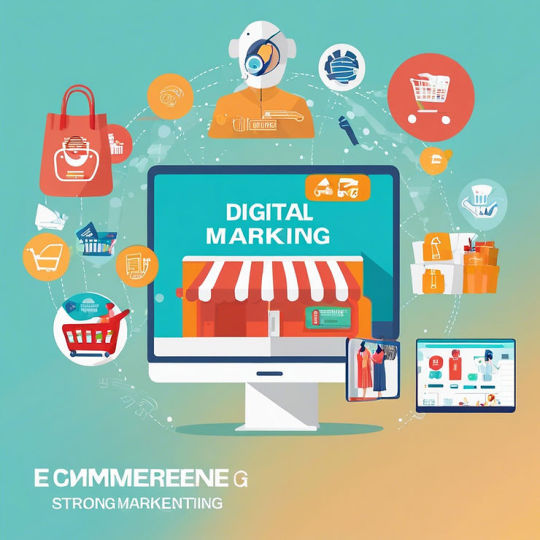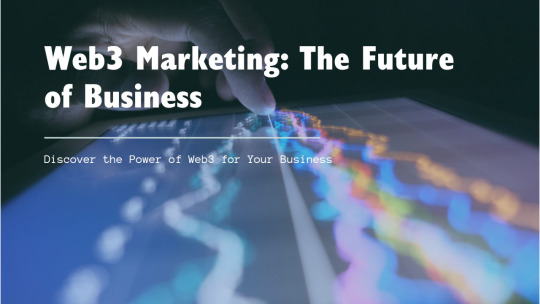Text

In today's digital age, e-commerce reigns supreme. Consumers have embraced the convenience and vast selection offered by online shopping. But in this competitive landscape, simply having an e-commerce website in Houston isn't enough. To thrive, e-commerce businesses need a robust digital marketing strategy.
#e-commerce website development company in houston#digital marketing services in houston#custom software development houston
0 notes
Text
The Digital Lifeline: Why E-Commerce Needs Strong Digital Marketing
In today's digital age, e-commerce reigns supreme. Consumers have embraced the convenience and vast selection offered by online shopping. But in this competitive landscape, simply having an e-commerce website in Houston isn't enough. To thrive, e-commerce businesses need a robust digital marketing strategy.

Digital marketing services in Houston can provide the tools and expertise needed to establish a strong online presence and drive sales. Here's why digital marketing is the lifeline of any successful e-commerce business:
1. Reaching the Right Audience: A Targeted Approach
Unlike traditional marketing methods with a scattered reach, digital marketing allows you to target your ideal customers with laser focus. Through social media advertising, search engine optimization (SEO), and email marketing, you can connect with people who are actively interested in the products or services you offer. This targeted approach maximizes your return on investment (ROI) by attracting potential customers who are more likely to convert into paying buyers.
2. Building Brand Awareness and Credibility
A strong digital marketing strategy helps you establish your brand in the e-commerce marketplace. Engaging content, active social media presence, and positive online reviews all contribute to building brand awareness and fostering trust with potential customers. When people recognize and trust your brand, they're more likely to consider you when making purchasing decisions.
3. Search Engine Optimization (SEO): The Power of Organic Visibility
Imagine having a storefront on a busy street, but with no signage. SEO is akin to putting up a bright, attractive sign that draws people in. By optimizing your website and content for relevant search terms, you increase the likelihood of potential customers finding you online. Partnering with a reputable SEO company in Houston can help you refine your SEO strategy and ensure your website ranks high in search results for keywords related to your products or services. This organic visibility drives qualified traffic to your website, translating into increased sales.
4. Content Marketing: Educating and Engaging Your Audience
Compelling content is the cornerstone of any successful digital marketing strategy. Informative blog posts, engaging product descriptions, and educational videos not only attract potential customers but also educate them about your brand and its offerings. By creating high-quality content that addresses your target audience's needs and interests, you establish yourself as a thought leader within your industry, fostering trust and loyalty.
5. Conversion Rate Optimization (CRO): Streamlining the Sales Funnel
Imagine having a leaky sales funnel – potential customers enter your website, but many don't convert into paying customers. Conversion Rate Optimization (CRO) helps plug those leaks by optimizing your website and landing pages to maximize conversions. By working with specialists in web development in Houston, you can create a user-friendly website experience that guides visitors through the buying journey seamlessly. This can involve streamlining the checkout process, adding clear calls to action, and optimizing product pages to showcase features and benefits effectively.
6. Social Media Marketing: Building Relationships and Fostering Engagement
Social media platforms offer a dynamic space to connect with your audience in a more personal way. Digital marketing services in Houston often encompass social media management, where experts can help you, craft engaging content, run targeted social media ads, and foster meaningful interactions with your target audience. Social media allows you to showcase your brand personality, connect with customers on a deeper level, and build a loyal following. Positive online reviews and user-generated content further enhance your brand image and credibility, driving sales and customer trust.
7. Email Marketing: Cultivating Long-Term Relationships
Email marketing remains a powerful tool for e-commerce businesses. By building an email list and crafting targeted email campaigns, you can nurture leads, promote new products, offer exclusive discounts, and stay connected with your audience. This personalized approach helps build long-term relationships with customers, encouraging repeat business and brand loyalty.
8. Data-Driven Decisions: Measuring Success and Optimizing Strategy
The beauty of digital marketing lies in its measurability. Unlike traditional marketing methods, you can track the performance of your campaigns in real-time using analytics tools. This data provides valuable insights into what's working and what's not, allowing you to constantly refine your digital marketing strategy for maximum effectiveness.
In conclusion, digital marketing is the cornerstone of success for any e-commerce business in today's competitive landscape. By leveraging a combination of the strategies mentioned above, you can reach the right audience, build brand awareness, nurture leads, and ultimately drive sales and profitability. Remember, a well-crafted digital marketing strategy is an ongoing investment that requires continuous monitoring and adaptation. With the right tools and expertise, you can harness the power of the digital world to propel your e-commerce business to new heights.
#seo company houston#digital marketing services in houston#custom software development houston#web development in houston
0 notes
Text
The Essence of SEO: An Explanation of Five Essential Ideas

In the ever-evolving landscape of digital marketing, SEO stands as the bedrock of online visibility and success. Mastering its intricacies is akin to unlocking the gates to unparalleled digital prominence. Let's delve into the five pivotal concepts that underscore the essence of SEO, illuminating pathways to digital eminence.
1. Keyword Research: Unearthing the Digital Gold
At the heart of every successful SEO campaign lies meticulous keyword research. This process entails identifying the words and phrases your target audience employs when searching for products or services. Armed with insights from tools like Google Keyword Planner or SEMrush, digital marketers can uncover the most relevant and lucrative keywords to optimize their content and web presence. Crafting content around these keywords not only enhances visibility but also ensures alignment with user intent.
2. On-Page Optimization: Fine-Tuning for Visibility
On-page optimization involves optimizing individual web pages to rank higher and earn more relevant traffic in search engines. This encompasses various aspects such as optimizing meta tags, headers, and URL structures, as well as integrating target keywords strategically within the content. Moreover, ensuring mobile-friendliness, enhancing page speed, and crafting engaging content are integral components of on-page optimization. By adhering to these practices, websites can resonate better with search engine algorithms, thereby amplifying their visibility and relevance.
3. Link Building: Forging Digital Pathways
Link building serves as the cornerstone of off-page SEO, accentuating a website's authority and credibility in the digital realm. It involves acquiring hyperlinks from other websites back to your own—a process akin to digital networking. However, not all links are created equal, quality reigns supreme over quantity. SEO service in Houston can leverage strategies such as guest blogging, influencer outreach, and directory submissions to cultivate a robust backlink profile. These inbound links signal to search engines the relevance and authority of your website, thereby augmenting its organic search rankings.
4. Technical SEO: Navigating the Digital Infrastructure
While on-page and off-page optimizations garner significant attention, technical SEO lurks in the background, silently steering the digital infrastructure towards optimal performance. This facet of SEO pertains to optimizing the technical aspects of a website to enhance its crawlability, indexability, and overall user experience. Tasks such as optimizing site structure, fixing crawl errors, implementing schema markup, and improving site speed fall under the purview of technical SEO. By ensuring a seamless digital foundation, websites can ascend the ranks of search engine result pages with aplomb.
5. Content Quality: The Reigning Sovereign
In the realm of SEO, content reigns supreme. Beyond mere keywords and algorithms, compelling content lies at the nexus of user engagement and search engine affinity. High-quality, relevant, and authoritative content not only captivates audiences but also earns coveted backlinks and social shares. From informative blog posts to captivating videos and interactive infographics, digital marketing company in Houston can wield a diverse array of content formats to captivate and convert audiences. By prioritizing content quality, websites can forge enduring connections with both users and search engines alike.
Conclusion: Navigating the SEO Landscape
In the intricate tapestry of SEO, these five concepts form the crux upon which digital success is built. By embracing keyword research, on-page optimization, link building, technical SEO, and content quality, businesses can chart a course towards sustained visibility, relevance, and success in the digital sphere. As the digital landscape continues to evolve, mastering these fundamental concepts remains imperative for businesses striving to leave an indelible mark in the digital realm. Embrace these concepts, and let your digital journey be one of perpetual ascent and accomplishment.
#digital marketing services in houston#seo company houston#web development in houston#custom software development houston
0 notes
Text
Exploring the 5 Types of Digital Marketing

In the ever-evolving landscape of marketing, digital marketing services in Houston have become paramount for businesses aiming to thrive in the digital realm. With the surge in online presence and the dominance of digital platforms, understanding the various types of digital marketing is crucial for any modern marketer. Let's delve into the five primary categories that constitute the digital marketing ecosystem.
1. Search Engine Optimization (SEO)
SEO service in Houston is a cornerstone of digital marketing strategies. It revolves around enhancing a website's visibility on search engine results pages (SERPs) organically. This is achieved through a myriad of techniques such as keyword optimization, content creation, and backlink building. The primary goal of SEO is to improve a website's ranking on search engines like Google, Bing, and Yahoo, thereby driving organic traffic and increasing brand exposure. By optimizing for relevant keywords and ensuring technical proficiency, businesses can attract qualified leads and establish authority within their niche.
2. Pay-Per-Click Advertising (PPC)
In contrast to SEO, PPC advertising offers a more immediate and targeted approach to reaching potential customers. It involves placing ads on search engines and other digital platforms and paying a fee each time the ad is clicked. Platforms like Google Ads and Bing Ads allow advertisers to bid on keywords relevant to their business, ensuring their ads appear prominently on search engine results pages. PPC campaigns offer precise targeting options, allowing businesses to tailor their ads based on demographics, interests, and browsing behavior. This results in higher conversion rates and a measurable return on investment (ROI).
3. Social Media Marketing (SMM)
With billions of active users worldwide, social media platforms have emerged as fertile ground for digital marketing endeavors. SMM involves leveraging social media channels such as Facebook, Instagram, Twitter, and LinkedIn to connect with target audiences and promote products or services. Through compelling content, engaging visuals, and strategic advertising, businesses can cultivate a loyal following and foster meaningful relationships with customers. SMM facilitates two-way communication, enabling brands to receive feedback, address inquiries, and humanize their online presence. By harnessing the power of social media, businesses can amplify brand awareness, drive website traffic, and generate leads.
4. Content Marketing
Content reigns supreme in the realm of digital marketing. Content marketing revolves around creating and distributing valuable, relevant, and consistent content to attract and retain a clearly defined audience. This content can take various forms, including blog posts, articles, videos, infographics, podcasts, and ebooks. Content marketing aims to educate, entertain, or inspire audiences, ultimately guiding them through the buyer's journey. By providing informative and engaging content, businesses can establish themselves as industry thought leaders and build trust with their target audience. Moreover, high-quality content is inherently shareable, extending its reach and amplifying its impact across digital channels.
5. Lead Generation
Lead generation lies at the heart of successful marketing endeavors, serving as the lifeblood for businesses seeking growth and expansion. Through strategic initiatives such as content marketing, social media engagement, and targeted advertising, businesses can attract, nurture, and convert prospects into loyal customers. By leveraging innovative tactics and cutting-edge technology, digital marketing company in Houston empower businesses to generate high-quality leads, fueling sales pipelines and driving sustainable revenue growth in today's competitive landscape.
Conclusion
In conclusion, digital marketing encompasses a diverse array of strategies and tactics aimed at enhancing online visibility, driving traffic, and ultimately, converting leads into customers. From SEO and PPC advertising to SMM and content marketing, each facet plays a vital role in achieving marketing objectives and fostering business growth. By leveraging these five types of digital marketing effectively, businesses can navigate the digital landscape with confidence, maximizing their online presence and staying ahead of the competition.
#digital marketing services in houston#e-commerce website development company in houston#seo company houston#web development in houston
0 notes
Text
#digital marketing services in houston#seo company houston#lead generation houston#digital marketing company in houston
0 notes
Text
0 notes
Text
The 7 Stages of Software Development: A Comprehensive Guide

In the realm of custom software development Houston, understanding the intricacies of the development process is paramount. From inception to deployment, software development encompasses a series of stages, each contributing uniquely to the final product's success. Let's delve into the seven pivotal stages that delineate the journey of software creation.
1. Requirement Analysis
The journey begins with discerning the client's needs and objectives. Custom software development Houston firms prioritize this phase to grasp the project's scope comprehensively. Through consultations and meetings, developers elucidate client requirements, ensuring a crystal-clear understanding before proceeding further.
2. Planning and Design
Once requirements are identified, meticulous planning ensues. This phase entails outlining the project's architecture, defining features, and formulating a roadmap. Designers conceptualize user interfaces (UI) and user experiences (UX), ensuring optimal functionality and aesthetics. Collaboration between digital marketing company in Houston and developers during this phase ensures alignment with market trends and user preferences.
3. Development
Armed with a robust plan, developers initiate the coding process. This stage is the crux of custom software development Houston, where lines of code transform ideas into tangible solutions. Utilizing programming languages and frameworks, developers craft intricate algorithms and functionalities, adhering to industry best practices for efficiency and scalability.
4. Testing
Rigorous testing is imperative to validate the software's integrity and functionality. Quality Assurance (QA) specialists conduct comprehensive tests, identifying bugs, glitches, and performance issues. Through various testing methodologies such as unit testing, integration testing, and acceptance testing, developers ensure a seamless user experience.
5. Deployment
With testing completed and bugs ironed out, the software is primed for deployment. Digital marketing company in Houston plays a vital role in devising deployment strategies to maximize visibility and user adoption. Whether deploying on-premises or through cloud platforms, a smooth transition ensures minimal disruption to operations.
6. Maintenance
Post-deployment, the journey continues with ongoing maintenance and support. Software requires periodic updates, patches, and enhancements to adapt to evolving user needs and technological advancements. Custom software development Houston firms offer dedicated support, addressing issues promptly and optimizing performance to sustain long-term viability.
7. Evaluation and Optimization
The final stage encompasses evaluating the software's performance and gathering user feedback. Digital marketing company in Houston leverages analytics tools to assess user engagement, identify pain points, and gather insights for optimization. Developers iterate based on feedback, fine-tuning features and functionalities to enhance user satisfaction and drive business growth.
Conclusion
In the dynamic landscape of custom software development Houston, navigating through the seven stages is crucial for success. From initial ideation to continuous optimization, each phase contributes synergistically to deliver innovative solutions that resonate with users and drive business objectives. Collaboration between digital marketing company in Houston and development teams ensures alignment with market demands and enhances the software's relevance and competitiveness. Embracing these stages with diligence and adaptability paves the path to software excellence and customer delight.
0 notes
Text
Web3 refers to the next generation of the internet, characterized by decentralized technologies like blockchain. Unlike Web 2.0, where power is concentrated in the hands of a few big players, Web3 aims to distribute control and ownership among its users. This shift has profound implications for marketing strategies, particularly in e-commerce website development company in Houston.
#digital marketing services in houston#web development in Houston#e-commerce website development company in Houston
0 notes
Text

#seo company houston#web development in Houston#e-commerce website development company in Houston#digital marketing services in houston
0 notes
Text
#e-commerce website development company in Houston#digital marketing company in Houston#web development in Houston
0 notes
Text
#seo company houston#digital marketing services in houston#e-commerce website development company in Houston
0 notes
Text

Exploring Web3 Marketing and Its Impact on Your Business
Hey there! Have you heard the buzz about Web3 marketing? It's the latest trend shaking up the digital world, and it could have a significant impact on how your company does business online. So, what exactly is Web3 marketing, and why should you care? Let's dive in and find out!
Web3 refers to the next generation of the internet, characterized by decentralized technologies like blockchain. Unlike Web 2.0, where power is concentrated in the hands of a few big players, Web3 aims to distribute control and ownership among its users. This shift has profound implications for marketing strategies, particularly in web development in Houston.
In traditional marketing, companies rely heavily on centralized platforms like Google and Facebook to reach their audience. However, Web3 introduces new avenues for customer engagement and interaction. For example, decentralized social media platforms built on blockchain technology offer greater privacy, security, and control over user data. This presents exciting opportunities for businesses to connect with their customers in more authentic and transparent ways.
One of the key features of Web3 marketing is the concept of decentralization. Instead of relying on intermediaries to facilitate transactions, businesses can use smart contracts and decentralized finance (DeFi) platforms to engage directly with their customers. This not only reduces costs but also eliminates the need for third-party oversight, making transactions faster, more efficient, and more secure.
Another important aspect of Web3 marketing is tokenization. Tokens are digital assets that represent ownership or access rights on a blockchain. By tokenizing products, services, or even loyalty programs, businesses can create new incentives for customer engagement and loyalty. For example, a retail e-commerce website development company in Houston could issue loyalty tokens to customers for making purchases, which can be redeemed for discounts or exclusive rewards.
Moreover, Web3 enables community-driven marketing initiatives. Instead of relying solely on paid advertisements, businesses can leverage their community of supporters to spread the word about their products or services. This could involve incentivizing users to create and share content, participate in discussions, or even contribute to the development of new products through crowdfunding campaigns.
However, it's essential to recognize that Web3 marketing is still in its infancy, and there are challenges that businesses need to navigate. For starters, the technology is complex and can be intimidating for those unfamiliar with blockchain and decentralized systems. Additionally, regulatory uncertainty and scalability issues may hinder widespread adoption in the near term.
Nevertheless, businesses that embrace Web3 marketing stand to gain a competitive advantage in the digital landscape. By leveraging decentralized technologies, they can build stronger, more resilient communities, foster trust and transparency, and unlock new revenue streams. Whether you're a digital marketing company in Houston or an e-commerce website development company in Houston, now is the time to start exploring the possibilities of Web3 and how they can transform your business.
In conclusion, Web3 marketing represents a paradigm shift in how businesses engage with their customers online. By embracing decentralization, tokenization, and community-driven initiatives, companies can unlock new opportunities for growth and innovation. So, don't get left behind – dive into the world of Web3 marketing today and position your business for success in the digital age!
#web development in Houston#digital marketing company in Houston#e-commerce website development company in Houston
0 notes
Text
Keywords are the words or phrases people type into search engines. By conducting keyword research, you can discover what terms your target audience is searching for. Include relevant keywords like SEO company Houston in your blog posts to attract the right audience.
0 notes
Text
Ever heard of SEO? It stands for Search Engine Optimization. It's like making your website more attractive to search engines like Google. When you write blogs using keywords like digital marketing services in Houston, it can help your website appear higher in search results. That means more people are likely to find your business when they search online.
0 notes
Text
0 notes
Text
0 notes
Text
This Is How to Use a Blog for Lead Generation in Blog Marketing

If you've ever wondered how blogs can help businesses attract potential customers, you're in the right place! Let's explore how lead generation Houston can be achieved through blog marketing. But first, let's understand what these terms mean.
What is Lead Generation?
Lead generation is like fishing for potential customers. You cast your line, hoping to hook someone who's interested in what you offer. In simpler terms, it's finding people who might want to buy what you're selling.
What is Blog Marketing?
Blog marketing is using blogs to promote your business. It's like showcasing your products or services in a magazine article but on the internet.
How Blogs Help with Lead Generation
Now, let's see how blogs can help with lead generation Houston:
1. Providing Valuable Information
Blogs are like treasure troves of information. When people search for something online, they often turn to blogs for answers. By writing helpful and informative blog posts, you can attract people who are looking for information related to your business.
2. Improving Search Engine Rankings
Ever heard of SEO? It stands for Search Engine Optimization. It's like making your website more attractive to search engines like Google. When you write blogs using keywords like digital marketing services in Houston, it can help your website appear higher in search results. That means more people are likely to find your business when they search online.
3. Engaging with Your Audience
Blogs allow you to connect with your audience on a personal level. You can encourage them to leave comments, ask questions, or share their thoughts. By engaging with your readers, you build trust and credibility, making them more likely to consider your business when they need what you offer.
4. Offering Freebies or Discounts
Who doesn't love free stuff or discounts? You can use your blog to offer special promotions, free trials, or downloadable resources in exchange for people's contact information. This way, you not only provide value to your audience but also capture leads for your business.
5. Promoting Your Products or Services
While blogs are great for providing valuable information, they're also an excellent platform for showcasing your products or services. You can write about how your offerings solve problems or improve people's lives, making them more inclined to purchase from you.
How to Get Started with Blog Marketing for Lead Generation
Ready to dive into blog marketing for lead generation Houston? Here are some steps to get you started:
1. Identify Your Audience
Before you start writing, it's essential to know who you're writing for. Who are your ideal customers? What are their interests, pain points, and needs? Understanding your audience will help you create content that resonates with them.
2. Do Keyword Research
Keywords are the words or phrases people type into search engines. By conducting keyword research, you can discover what terms your target audience is searching for. Include relevant keywords like SEO company Houston in your blog posts to attract the right audience.
3. Create Valuable Content
Focus on creating high-quality, valuable content that addresses your audience's questions and concerns. Whether it's how-to guides, tips and tricks, or industry insights, make sure your blog posts offer something meaningful to your readers.
4. Optimize for SEO
Incorporate your chosen keywords naturally throughout your blog posts. Also, pay attention to other SEO factors like meta titles, meta descriptions, and image alt texts. This will help improve your blog's visibility in search engine results.
5. Promote Your Blog
Don't just publish your blog posts and hope for the best. Share them on social media, email newsletters, and other relevant platforms to reach a wider audience. Encourage your followers to read and share your content, expanding your reach even further.
6. Analyze and Adapt
Track the performance of your blog posts using tools like Google Analytics. Pay attention to metrics like traffic, engagement, and conversions. Use this data to refine your blog marketing strategy and create even more effective content in the future.
By following these steps, you can harness the power of blogs for lead generation Houston and take your business to new heights!
0 notes